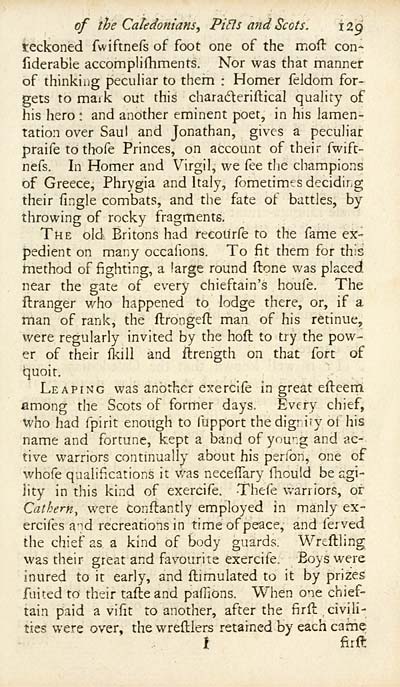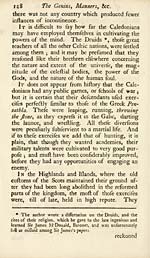Blair Collection > Critical dissertations on the origin, antiquities, language, government, manners, and religion, of the antient Caledonians, their posterity the Picts, and the British and Irish Scots
(167)
Download files
Complete book:
Individual page:
Thumbnail gallery: Grid view | List view

of the Caledonians^ PiHs and Scots, 1 29
reckoned fwiftnefs of foot one of the molT: con*
fiderable accomplifhments. Nor was that manner
of thinkiijg peculiar to them : Homer feldom for-
gets to maik out this charaderiflical quahry of
his hero : and another eminent poet, in his lamen-
tation over Saul and Jonathan, gives a peculiar
praife to thofe Princes, on account of their fwift-
nefs. In Homer and Virgil, we fee the champions
of Greece, Phrygia and Italy, fometimes deciding
their fmgle combats, and the fate of battles, by
throwing of rocky fragments.
The old Britons had reeotirfe to the fame ex-
pedient on many occafions. To fit them for this
rnethod of fighting, a large round flone was placed
near the gate of every chieftain's houfe. The
ftranger who happened to lodge there, or, if a
man of rank, the ftrongefl man of his retinue,
were regularly invited by the hofl to try the pow-
er of their fkill and ftrength on that fort of
quoit.
Leaping was another exercife in great efteem
among the Scots of former days. Every chief,
who had fpirit enough to fupport thedigrify ot his
name and fortune, kept a band of you'-.g and ac-
tive warriors continually about his perfon, one of
whofe qualifications it v,'as necelTary fhould be sgi-
lity in this kind of exercife. Thefe v/arriors, or
Catkern, were conftantly employed in manly ex-
ercifes and recreations in time of peace, and (ti'ftd
the chief as a kind of body guards. Wreftling
was their great and favourite exercife. Boys were
inured to it early, and flimulated to it by prizes;
fuited to their tafteand paffions. When one chief-
tain paid a vifit to another, after the firft civili-
ties were over, the wreftlers retained by each came
reckoned fwiftnefs of foot one of the molT: con*
fiderable accomplifhments. Nor was that manner
of thinkiijg peculiar to them : Homer feldom for-
gets to maik out this charaderiflical quahry of
his hero : and another eminent poet, in his lamen-
tation over Saul and Jonathan, gives a peculiar
praife to thofe Princes, on account of their fwift-
nefs. In Homer and Virgil, we fee the champions
of Greece, Phrygia and Italy, fometimes deciding
their fmgle combats, and the fate of battles, by
throwing of rocky fragments.
The old Britons had reeotirfe to the fame ex-
pedient on many occafions. To fit them for this
rnethod of fighting, a large round flone was placed
near the gate of every chieftain's houfe. The
ftranger who happened to lodge there, or, if a
man of rank, the ftrongefl man of his retinue,
were regularly invited by the hofl to try the pow-
er of their fkill and ftrength on that fort of
quoit.
Leaping was another exercife in great efteem
among the Scots of former days. Every chief,
who had fpirit enough to fupport thedigrify ot his
name and fortune, kept a band of you'-.g and ac-
tive warriors continually about his perfon, one of
whofe qualifications it v,'as necelTary fhould be sgi-
lity in this kind of exercife. Thefe v/arriors, or
Catkern, were conftantly employed in manly ex-
ercifes and recreations in time of peace, and (ti'ftd
the chief as a kind of body guards. Wreftling
was their great and favourite exercife. Boys were
inured to it early, and flimulated to it by prizes;
fuited to their tafteand paffions. When one chief-
tain paid a vifit to another, after the firft civili-
ties were over, the wreftlers retained by each came
Set display mode to: Large image | Transcription
Images and transcriptions on this page, including medium image downloads, may be used under the Creative Commons Attribution 4.0 International Licence unless otherwise stated. ![]()
| Permanent URL | https://digital.nls.uk/76288448 |
|---|
| Description | A selection of books from a collection of more than 500 titles, mostly on religious and literary topics. Also includes some material dealing with other Celtic languages and societies. Collection created towards the end of the 19th century by Lady Evelyn Stewart Murray. |
|---|
| Description | Selected items from five 'Special and Named Printed Collections'. Includes books in Gaelic and other Celtic languages, works about the Gaels, their languages, literature, culture and history. |
|---|

